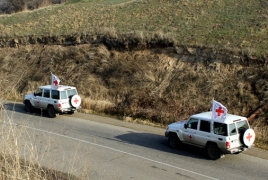Red Cross closure in Baku raises concerns for Armenian detainees March 6, 2025 - 19:49 AMT PanARMENIAN.Net - Azerbaijan has decided to terminate the operations of the International Committee of the Red Cross (ICRC) in Baku, a decision confirmed by the organization's local representative on March 5. International law expert Siranush Sahakyan, commenting on the implications for communication with Armenian prisoners of war, stated that the closure of the ICRC means the fate of Armenians is now entirely at Baku’s discretion, Armenpress reports. She noted that shutting down the ICRC’s office severs the last available channel of communication with Armenian detainees in Baku, deepening their suffering and increasing uncertainty. "This means that the fate of Armenians held in Baku is now entirely dependent on the whims of the Azerbaijani authorities, which could serve as an additional political leverage against Armenia’s leadership," she emphasized. According to Sahakyan, the ICRC was the only organization directly visiting prisoners of war, even though it lacked mechanisms to prevent torture. She pointed out that as the human rights situation in Baku deteriorates, Azerbaijani authorities are deliberately restricting the work of organizations monitoring these conditions. "In the case of the ICRC, Azerbaijan’s targeted approach is evident, as the organization’s core mission is to mitigate the humanitarian consequences of conflicts. Given the context of the Nagorno-Karabakh conflict, Armenians were the primary beneficiaries of the Red Cross’s work, while the organization itself was not engaged in addressing domestic human rights issues," she said. Regarding Armenia’s possible response, Sahakyan stressed the need to engage other international bodies, such as the Council of Europe’s Committee for the Prevention of Torture or relevant UN mandate holders. She also suggested developing alternative mechanisms to ensure diplomatic or consular access. "The Vienna Convention guarantees foreign nationals held abroad the right to consular visits, which is a fundamental right crucial for a fair trial. Due to the lack of diplomatic relations between Armenia and Azerbaijan, Armenian consular officers cannot conduct such visits. However, the right can be delegated to third-party neutral states. This is why civil society organizations have appealed to the Swiss authorities to facilitate consular access," Sahakyan added. Addressing Armenia’s diplomatic efforts, the Armenian Foreign Ministry referred to Foreign Minister Ararat Mirzoyan’s remarks in Parliament on March 5, where he detailed recent efforts to secure the release of Armenian prisoners. "I want to highlight a few notable actions from the past week or ten days. At the UN Human Rights Council in Geneva—arguably the most authoritative body on this issue—I delivered a public address, dedicating a significant portion to the topic of Armenian prisoners, their sham trials, and the violations of their rights, including torture and unlawful treatment. I also met with the President of the ICRC. This all happened within the past week to ten days. Additionally, I held discussions with the UN High Commissioner for Human Rights, one of the key figures in this field. Just two or three days after our meeting, the High Commissioner, Volker Türk, issued a statement urging Azerbaijani authorities to immediately release all Armenian detainees," the minister said. The Office of Armenia’s Representative for International Legal Affairs stated that although the ICRC was the primary means of communication with the prisoners, it was not the sole source of information. "Certain updates on detainees are also received through the European Court of Human Rights. Since there are ongoing international legal proceedings between Armenia and Azerbaijan, and because there have been prior rulings by the court on interim measures, Azerbaijan is obligated to periodically provide information on the detainees' conditions and health status," the office stated. Earlier, the Azerbaijani government also announced its intention to shut down the offices of four UN agencies: UNDP, UNFPA, UNHCR, and UNICEF. Grigoryan added that the situation around the world and particularly in the region is very difficult. The Armenian Defense Ministry has denied Azerbaijan's accusations of violating the ceasefire. Armenian Prime Minister Nikol Pashinyan took to social media to thank his Lithuanian counterpart for the contribution. President of the Armenian parliament Alen Simonyan met with the Speaker of the Azerbaijani Milli Majlis Sahiba Gafarova. Partner news |